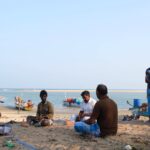This article was published more than 3 years ago.
We are saddened to share that Fund grantee Josoor, a leading migrants’ rights group based in Turkey, has been forced to end their critical work documenting border violence along the Balkan migration route.
For the last two and a half years, Josoor has been on the front lines of the migration crisis in Europe, shedding light on border violence, collecting survivors’ testimonies, raising awareness of countless human rights violations, and providing support to migrants and refugees who have been the victims of state-sponsored abuse.
As a member of the Border Violence Monitoring Network, they published the Black Book of Pushbacks in 2020—a landmark publication that included nearly 900 group testimonies from over 12,000 migrants and refugees who had been subject to dehumanizing conditions and illegally forced back across borders by state authorities.
For their indefatigable efforts to document border violence and support people on the move, Josoor has been the target of persistent harassment, intimidation, and threats. Asylum seekers have been recruited to act as informants on Josoor’s work, and team members’ communications have been illegally surveilled. The organization faces multiple criminal investigations in Greece, where authorities have accused them of espionage and violation of state secrets—all for shedding light on the shocking violence taking place at EU borders.
This campaign of persecution has rendered their work impossible and forced the founders of Josoor to dissolve the organization. Amid deteriorating human rights conditions in Turkey and increased threats to their staff’s security, they are committed to prioritizing the safety of their staff.
“The secondary criminalization of human rights defenders is only occurring because forced migration itself is criminalized,” says Natalie Gruber, co-founder and spokesperson of Josoor.
“Cases like ours where European NGOs are criminalized have always received a lot of attention, legal defense funding, and solidarity,” says Gruber. “But countless people have been locked up for years on flimsy charges and without fair trial all over Europe, simply for having crossed a border and seeking protection as is their legal right. That is the real issue here, and that is where the focus and attention of the public should be directed.”
Josoor’s case reflects a disturbing trend we have observed around the world: the criminalization of migration and persecution of migrants’ rights activists.
Across Europe, an alarming number of migrants’ rights groups have been targeted by state authorities. Four member organizations of the Border Violence Monitoring Network—Are You Syrious in Croatia, No Name Kitchen in Serbia, and Mare Liberum in addition to Josoor—have faced coordinated state efforts to discredit their work and intimidate their staff.
Helena Maleno of grantee Caminando Fronteras, who has saved countless lives rescuing migrants at risk in the Mediterranean, faced bogus charges of human trafficking in Morocco. Although the charges were dropped due to the overwhelming lack of evidence, she is unable to return home to Morocco.
“Helping migrants is becoming a crime,” says Houda Benmbarek, who leads the Fund’s Migrants’ Rights Program. “There is a growing trend to criminalize the work of aid groups who support people on the move and human rights defenders who are involved in documenting pushbacks.”
“Organizations on the ground are still struggling and resisting. As their peers are forced to shut down, they will also feel a great pressure and an immense burden to carry on with their work,” says Benmbarek. “Yet the people on the move are the ones paying the highest price.”
The Fund stands in solidarity with people on the move and with the courageous frontline activists defending their human rights. We are committed to funding their vital work, supporting their safety and security, and building a global movement for migrants’ rights. Together, we can create a more welcoming world.
For Media
To speak with Natalie Gruber or Houda Benmbarek, please contact:
Washington: Cooper Hewell at chewell@globalhumanrights.org
London: Robin Pierro at rpierro@globalhumanrights.org


